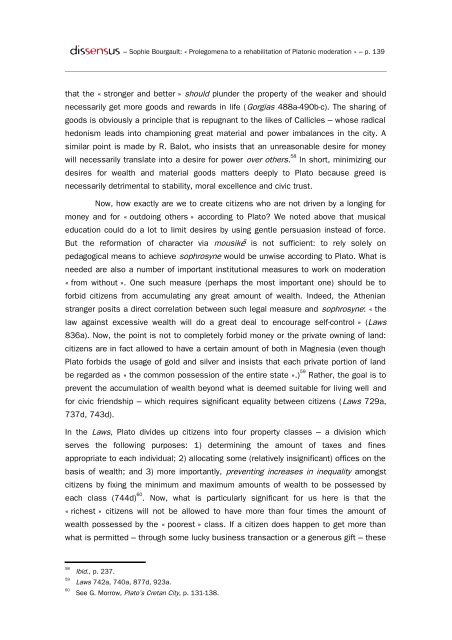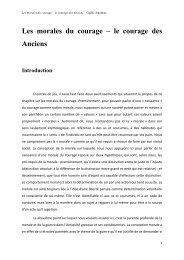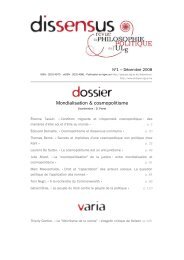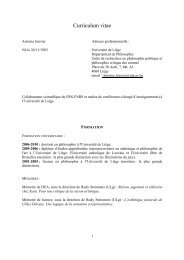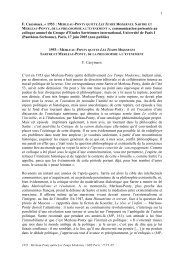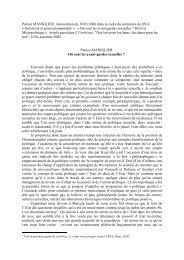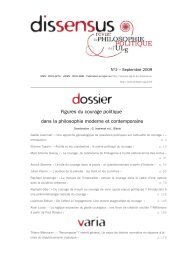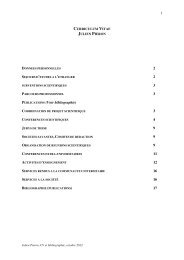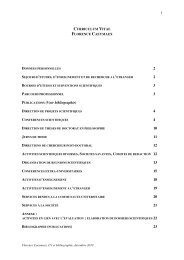Subjectivations politiques et économie des savoirs - Service de ...
Subjectivations politiques et économie des savoirs - Service de ...
Subjectivations politiques et économie des savoirs - Service de ...
Create successful ePaper yourself
Turn your PDF publications into a flip-book with our unique Google optimized e-Paper software.
– Sophie Bourgault: « Prolegomena to a rehabilitation of Platonic mo<strong>de</strong>ration » – p. 139<br />
that the « stronger and b<strong>et</strong>ter » should plun<strong>de</strong>r the property of the weaker and should<br />
necessarily g<strong>et</strong> more goods and rewards in life (Gorgias 488a-490b-c). The sharing of<br />
goods is obviously a principle that is repugnant to the likes of Callicles – whose radical<br />
hedonism leads into championing great material and power imbalances in the city. A<br />
similar point is ma<strong>de</strong> by R. Balot, who insists that an unreasonable <strong><strong>de</strong>s</strong>ire for money<br />
will necessarily translate into a <strong><strong>de</strong>s</strong>ire for power over others. 58 In short, minimizing our<br />
<strong><strong>de</strong>s</strong>ires for wealth and material goods matters <strong>de</strong>eply to Plato because greed is<br />
necessarily d<strong>et</strong>rimental to stability, moral excellence and civic trust.<br />
Now, how exactly are we to create citizens who are not driven by a longing for<br />
money and for « outdoing others » according to Plato? We noted above that musical<br />
education could do a lot to limit <strong><strong>de</strong>s</strong>ires by using gentle persuasion instead of force.<br />
But the reformation of character via mousikē is not sufficient: to rely solely on<br />
pedagogical means to achieve sophrosyne would be unwise according to Plato. What is<br />
nee<strong>de</strong>d are also a number of important institutional measures to work on mo<strong>de</strong>ration<br />
« from without ». One such measure (perhaps the most important one) should be to<br />
forbid citizens from accumulating any great amount of wealth. In<strong>de</strong>ed, the Athenian<br />
stranger posits a direct correlation b<strong>et</strong>ween such legal measure and sophrosyne: « the<br />
law against excessive wealth will do a great <strong>de</strong>al to encourage self-control » (Laws<br />
836a). Now, the point is not to compl<strong>et</strong>ely forbid money or the private owning of land:<br />
citizens are in fact allowed to have a certain amount of both in Magnesia (even though<br />
Plato forbids the usage of gold and silver and insists that each private portion of land<br />
be regar<strong>de</strong>d as « the common possession of the entire state ».) 59 Rather, the goal is to<br />
prevent the accumulation of wealth beyond what is <strong>de</strong>emed suitable for living well and<br />
for civic friendship – which requires significant equality b<strong>et</strong>ween citizens (Laws 729a,<br />
737d, 743d).<br />
In the Laws, Plato divi<strong><strong>de</strong>s</strong> up citizens into four property classes – a division which<br />
serves the following purposes: 1) d<strong>et</strong>ermining the amount of taxes and fines<br />
appropriate to each individual; 2) allocating some (relatively insignificant) offices on the<br />
basis of wealth; and 3) more importantly, preventing increases in inequality amongst<br />
citizens by fixing the minimum and maximum amounts of wealth to be possessed by<br />
each class (744d) 60 . Now, what is particularly significant for us here is that the<br />
« richest » citizens will not be allowed to have more than four times the amount of<br />
wealth possessed by the « poorest » class. If a citizen does happen to g<strong>et</strong> more than<br />
what is permitted – through some lucky business transaction or a generous gift – these<br />
58<br />
59<br />
60<br />
Ibid., p. 237.<br />
Laws 742a, 740a, 877d, 923a.<br />
See G. Morrow, Plato’s Cr<strong>et</strong>an City, p. 131-138.


